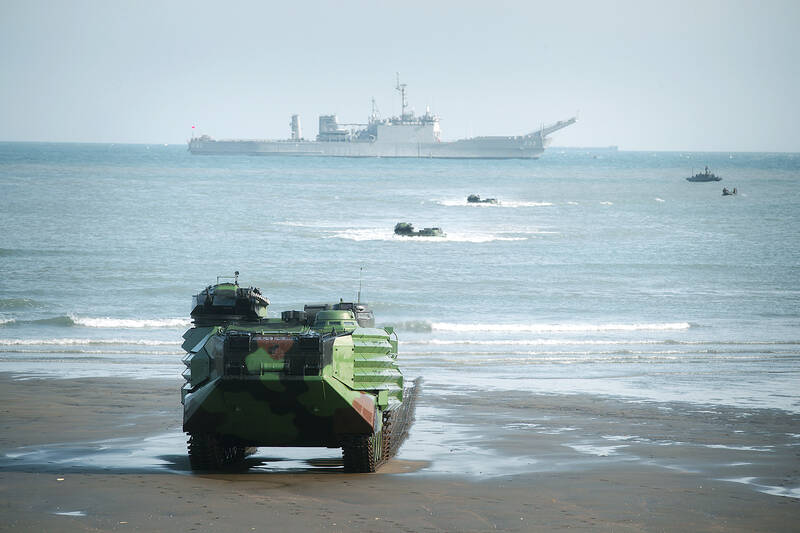The armed forces are to hold field exercises on Monday and Tuesday in coastal regions dubbed “red beaches” to train defending Taiwan proper against a multipronged amphibious attack, a defense official familiar with the matter said, speaking on condition of anonymity.
Live-fire drills are to be conducted on beaches and near shores in New Taipei City’s Tamsui District (淡水), at the Port of Taipei and in Taoyuan’s Guanyin District (觀音), a notice posted on the bulletin of the Fisheries Administration said.
The official said the exercises would test the army’s ability to react quickly and utilize mobile reserves to defend simultaneous attacks by the Chinese military on multiple fronts.

Photo: CNA
In the war game, the Sixth Army Corps would play the defending force and the 151st Fleet would be the aggressor, the official added.
If Beijing were to invade Taiwan, the Chinese military would attack in multiple coastal areas, as few beaches in Taiwan proper are suitable landing sites for amphibious operations, they said.
The field exercises are scheduled to begin the same day as the computer-assisted simulation component of the annual Han Kuang drills, which would conclude on Friday next week, the official said,
Findings from past tabletop exercises and trends seen in the Russia-Ukraine war would be incorporated into the computer-assisted portion of the drills, which would be based on the Joint Theater Level Simulation technology platform, the official said.
The possible landing sites for the Chinese military are dubbed “red beaches” among military analysts, they said.
In 2017, Ian Easton, now senior director at the US-based Project 2049 Institute, identified 14 vulnerable beaches that could be used as landing sites, the official said.
The Taiwanese armed forces recognize that such vulnerabilities exist, but do not agree with Easton’s assessment of their locations and number, they said.
Separately, the Ministry of National Defense last week told lawmakers that the army plans to buy 2,060 light machine guns for combat units for NT$428.9 million (US$13.94 million) over five years.
The weapons would be allocated to enhance frontline units’ firepower and their capability to conduct counterattacks against Chinese amphibious and airborne, air assault, infiltration and sabotage operations, it said.
A public version of the ministry’s proposed budget revealed a flurry of plans to buy arms and equipment amid a planned expansion of the army and marine corps following the implementation of one-year military conscription and the expansion of the reserves.
The budget proposals include NT$521 million for grenade launchers, automatic grenade launchers and pistols; NT$108 million for 107 81mm mortars; NT$232.2 million for chemical, biological, radiological and nuclear protective equipment; NT$1.759 billion for 10,000 night vision devices; and NT$22.8 million for 2,000 binoculars.

CHAOS: Iranians took to the streets playing celebratory music after reports of Khamenei’s death on Saturday, while mourners also gathered in Tehran yesterday Iranian Supreme Leader Ayatollah Ali Khamenei was killed in a major attack on Iran launched by Israel and the US, throwing the future of the Islamic republic into doubt and raising the risk of regional instability. Iranian state television and the state-run IRNA news agency announced the 86-year-old’s death early yesterday. US President Donald Trump said it gave Iranians their “greatest chance” to “take back” their country. The announcements came after a joint US and Israeli aerial bombardment that targeted Iranian military and governmental sites. Trump said the “heavy and pinpoint bombing” would continue through the week or as long

TRUST: The KMT said it respected the US’ timing and considerations, and hoped it would continue to honor its commitments to helping Taiwan bolster its defenses and deterrence US President Donald Trump is delaying a multibillion-dollar arms sale to Taiwan to ensure his visit to Beijing is successful, a New York Times report said. The weapons sales package has stalled in the US Department of State, the report said, citing US officials it did not identify. The White House has told agencies not to push forward ahead of Trump’s meeting with Chinese President Xi Jinping (習近平), it said. The two last month held a phone call to discuss trade and geopolitical flashpoints ahead of the summit. Xi raised the Taiwan issue and urged the US to handle arms sales to

BIG SPENDERS: Foreign investors bought the most Taiwan equities since 2005, signaling confidence that an AI boom would continue to benefit chipmakers Taiwan Semiconductor Manufacturing Co’s (TSMC, 台積電) market capitalization swelled to US$2 trillion for the first time following a 4.25 percent rally in its American depositary receipts (ADR) overnight, putting the world’s biggest contract chipmaker sixth on the list of the world’s biggest companies by market capitalization, just behind Amazon.com Inc. The site CompaniesMarketcap.com ranked TSMC ahead of Saudi Aramco and Meta Platforms Inc. The Taiwanese company’s ADRs on Tuesday surged to US$385.75 on the New York Stock Exchange, as strong demand for artificial intelligence (AI) applications led to chip supply constraints and boost revenue growth to record-breaking levels. Each TSMC ADR represents

State-run CPC Corp, Taiwan (CPC, 台灣中油) yesterday said that it had confirmed on Saturday night with its liquefied natural gas (LNG) and crude oil suppliers that shipments are proceeding as scheduled and that domestic supplies remain unaffected. The CPC yesterday announced the gasoline and diesel prices will rise by NT$0.2 and NT$0.4 per liter, respectively, starting Monday, citing Middle East tensions and blizzards in the eastern United States. CPC also iterated it has been reducing the proportion of crude oil imports from the Middle East and diversifying its supply sources in the past few years in response to geopolitical risks, expanding